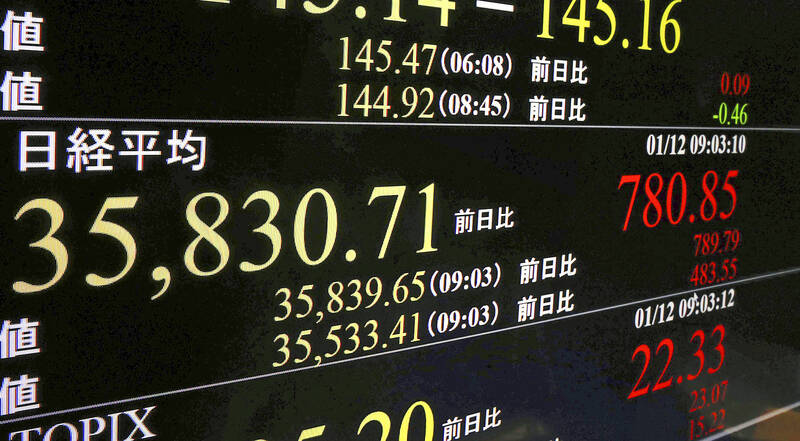Japanese equities extended their rally into the new year, with the Nikkei 225 Stock Average completing the biggest weekly gain since March 2022.
The blue-chip gauge rose 1.5 percent yesterday, buoyed by the yen’s weakening since the start of the year and upbeat expectations for the nation’s shares. It ended with a weekly advance of more than 6 percent.
The TOPIX benchmark, which has a wider variety of companies, climbed for a seventh trading session, during which all of its 33 sub-indices have advanced. The strength in Japan has taken both key indices to 34-year highs this week amid inflows from foreign investors, a favorable exchange rate and investor optimism that decades-long deflation is coming to an end.

Photo: Kyodo News via AP
Adding to the market’s momentum, Chinese investors are flocking to Japanese exchange-traded funds, with turnover in one fund rising to a record high on Wednesday. The introduction of revamped tax-free accounts this year is also playing a major role in the rally for Japanese equities.
“Large-cap stocks, high-dividend stocks, and growth stocks with foreign demand are likely to continue to attract buying due to overseas investors’ buying and from tax-exempt savings accounts,” Mizuho Securities Co market strategist Nobuhiko Kuramochi said.
A strong start to this year on the back of Japan’s outperformance of other major markets last year points to a big shift in the investment environment for the world’s third-largest economy, Nikko Asset Management Co said.
Tensions between the US and China should continue to increase attention on Japanese equities this year, Goldman Sachs Group Inc said.
Both the Nikkei 225 and TOPIX completed an annual advance of more than 25 percent last year — their best performance in a decade.
While the all-country index is popular with tax-exempt retirement savings accounts known as NISA, Japanese companies that have high dividends are also attracting demand, Asset Management One chief strategist Takeru Ogihara said.
“There is a possibility that investors will buy in the first half of the year before March, or move a little ahead of schedule,” he added.
Electric appliances and exporting companies were the largest contributors to the TOPIX yesterday as the yen headed for a second weekly loss on the receding view that the Bank of Japan would end its negative interest rate this month.
Fast Retailing Co led gains in the Nikkei 225, jumping to a record high after the Uniqlo owner’s first-quarter operating profit beat the average analyst estimate.

SETBACK: Apple’s India iPhone push has been disrupted after Foxconn recalled hundreds of Chinese engineers, amid Beijing’s attempts to curb tech transfers Apple Inc assembly partner Hon Hai Precision Industry Co (鴻海精密), also known internationally as Foxconn Technology Group (富士康科技集團), has recalled about 300 Chinese engineers from a factory in India, the latest setback for the iPhone maker’s push to rapidly expand in the country. The extraction of Chinese workers from the factory of Yuzhan Technology (India) Private Ltd, a Hon Hai component unit, in southern Tamil Nadu state, is the second such move in a few months. The company has started flying in Taiwanese engineers to replace staff leaving, people familiar with the matter said, asking not to be named, as the

The prices of gasoline and diesel at domestic fuel stations are to rise NT$0.1 and NT$0.4 per liter this week respectively, after international crude oil prices rose last week, CPC Corp, Taiwan (台灣中油) and Formosa Petrochemical Corp (台塑石化) announced yesterday. Effective today, gasoline prices at CPC and Formosa stations are to rise to NT$27.3, NT$28.8 and NT$30.8 per liter for 92, 95 and 98-octane unleaded gasoline respectively, the companies said in separate statements. The price of premium diesel is to rise to NT$26.2 per liter at CPC stations and NT$26 at Formosa pumps, they said. The announcements came after international crude oil prices

DOLLAR SIGNS: The central bank rejected claims that the NT dollar had appreciated 10 percentage points more than the yen or the won against the greenback The New Taiwan dollar yesterday fell for a sixth day to its weakest level in three months, driven by equity-related outflows and reactions to an economics official’s exchange rate remarks. The NT dollar slid NT$0.197, or 0.65 percent, to close at NT$30.505 per US dollar, central bank data showed. The local currency has depreciated 1.97 percent so far this month, ranking as the weakest performer among Asian currencies. Dealers attributed the retreat to foreign investors wiring capital gains and dividends abroad after taking profit in local shares. They also pointed to reports that Washington might consider taking equity stakes in chipmakers, including Taiwan Semiconductor

A German company is putting used electric vehicle batteries to new use by stacking them into fridge-size units that homes and businesses can use to store their excess solar and wind energy. This week, the company Voltfang — which means “catching volts” — opened its first industrial site in Aachen, Germany, near the Belgian and Dutch borders. With about 100 staff, Voltfang says it is the biggest facility of its kind in Europe in the budding sector of refurbishing lithium-ion batteries. Its CEO David Oudsandji hopes it would help Europe’s biggest economy ween itself off fossil fuels and increasingly rely on climate-friendly renewables. While